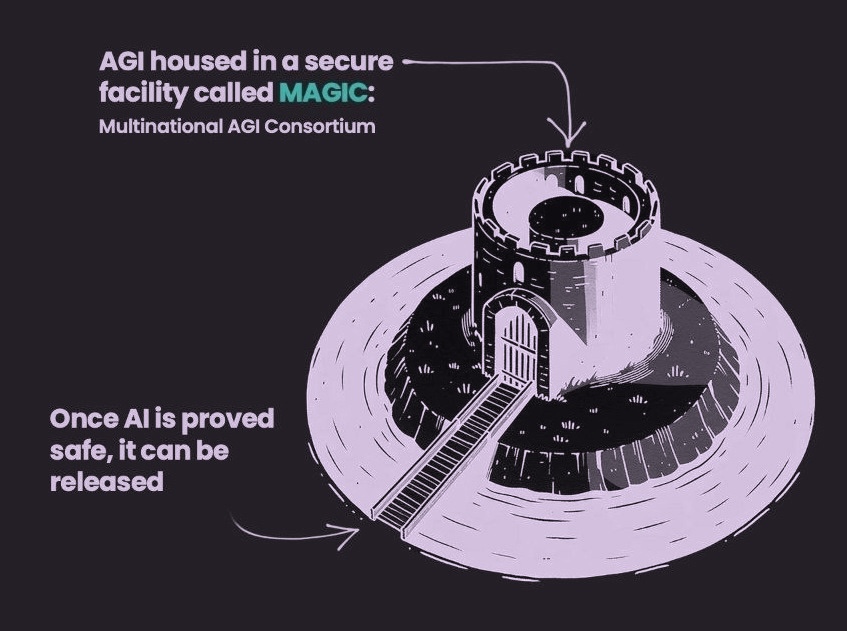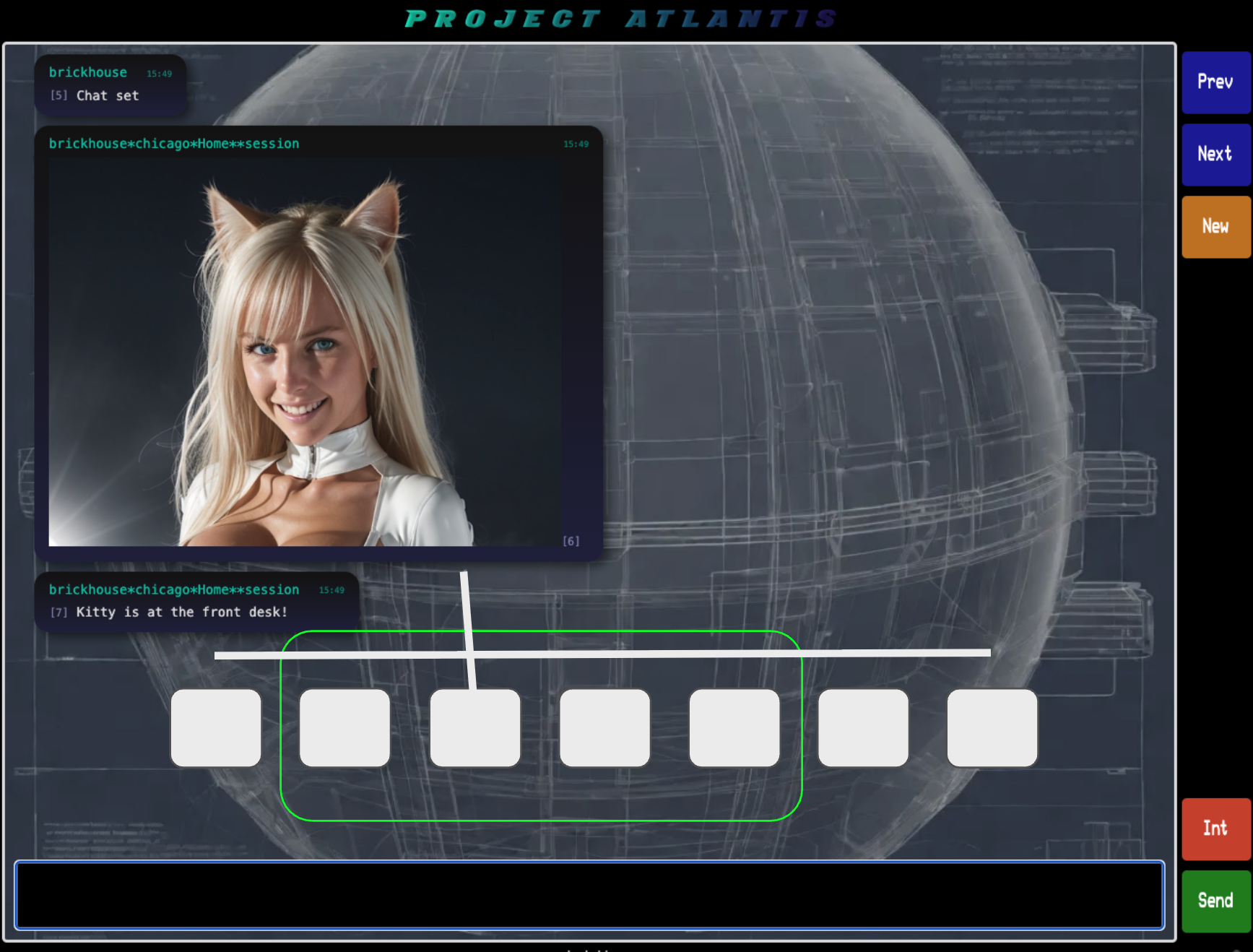PROJECT
ATLANTIS
A Future Vision for Greenland
New Innovation Age
The age of drones and robots is upon us.
But what should we do with them? Hopefully not just start wars.
Post-scarcity is possible when we can convert energy into abundance - food, good, shelter, etc. - via automation.
Especially as the robots keep getting smarter
The New Frontier
Our mission is to build a collaborative network of AI agents and developers working together to enable robot-driven frontier development, starting with Greenland.
Using Model Context Protocol (MCP), we're creating an ecosystem where agents discover and use each other's capabilities to coordinate autonomous robots solving real-world challenges.

MAGIC
MAGIC stands for the Multinational Artificial General Intelligence (AGI) Consortium, which is a proposal to establish an international research zone for advanced AI
— Project Atlantis (@atlantis2point0) May 2, 2025
AGI is inevitable but political fear of AI is slowing down progress, especially in Europe, even as China is surging ahead.
MAGIC is a compromise that lets robot research continue at a rapid pace, but puts a moat of protection around the robots in a runaway situation.
This moat also provides protection against adversaries (namely China and Russia). Greenland provides the perfect location for a MAGIC site

Why Greenland?
Development of Greenland isn't just available—it's inevitable.
It's regularly featured in movies as the ultimate eyrie. Switzerland with one heck of a moat
Strategic Importance:
• Critical minerals (rare earths, uranium, zinc, lead, copper)
• Receding Arctic ice opening new shipping routes
• Geopolitical positioning with looming drone wars
• Untapped resources worth trillions
• Data center potential (free cooling, renewable energy)
• Critical minerals (rare earths, uranium, zinc, lead, copper)
• Receding Arctic ice opening new shipping routes
• Geopolitical positioning with looming drone wars
• Untapped resources worth trillions
• Data center potential (free cooling, renewable energy)
Perfect Proving Ground for Emerging Tech:
• Harsh environment for advanced robotics in extreme Mars-like conditions
• Heavy-lift drones for rugged terrain buildout
• Low population density allows rapid deployment
• Boring Co autonomous tunneling technology through mountains and the ice sheet
• Starlink internet connectivity
• SMR nuclear and small scale hydro to power popup towns
• Autonomous boat supply chain logistics in iceberg-laden waters
• Resource abundance funds development
• Harsh environment for advanced robotics in extreme Mars-like conditions
• Heavy-lift drones for rugged terrain buildout
• Low population density allows rapid deployment
• Boring Co autonomous tunneling technology through mountains and the ice sheet
• Starlink internet connectivity
• SMR nuclear and small scale hydro to power popup towns
• Autonomous boat supply chain logistics in iceberg-laden waters
• Resource abundance funds development
MCP is Robot Infrastructure
Model Context Protocol provides the various tools that robots need to operate.

The Atlantis MCP Server
Model Context Protocol lets you run tools locally while connecting to a collaborative cloud network.
Atlantis MCP Server inverts traditional cloud architecture—you control what runs where.
You don't need to care about Greenland to benefit—use it to automate any workflow: business processes (marketing, analytics, reporting), development tasks (testing, deployment, monitoring), personal productivity (research, content creation), or make your ComfyUI workflows available to AI agents.
Create dynamic functions that other developers' agents can discover and use.
How Agent Discovery Works
When you run atlantis-mcp-server:
1. Clone from GitHub and run a Python remote locally
2. Write Python functions with
3. Functions automatically become MCP tools
4. Connect to projectatlantis.ai cloud
5. Share tools with the network with @public or keep them private to a group with @protected
2. Write Python functions with
@visible decorator3. Functions automatically become MCP tools
4. Connect to projectatlantis.ai cloud
5. Share tools with the network with @public or keep them private to a group with @protected
Network Effect Example:
• Developer A: Geological analysis functions
• Developer B: Logistics optimization functions
• Developer C: Equipment scheduling functions
→ All three remotes coordinate robot-driven mining operations
• Developer D: Infrastructure planning functions
→ Discovers and uses all of the above
• Developer B: Logistics optimization functions
• Developer C: Equipment scheduling functions
→ All three remotes coordinate robot-driven mining operations
• Developer D: Infrastructure planning functions
→ Discovers and uses all of the above
Scale: 10 developers = 10 tool sets | 100 developers = 100 tool sets combinable in thousands of ways | 1,000 developers = emergent capabilities nobody planned
The whole becomes greater than the sum of parts.
Quick Start
1. Install Python
2. Clone github.com/ProjectAtlantis-dev/atlantis-mcp-server and install Python requirements
3. Run the Python remote locally (with venv etc)
4. Connect to projectatlantis.ai with your email
5. Write functions in
6. Add third-party MCP servers as JSON configs in
2. Clone github.com/ProjectAtlantis-dev/atlantis-mcp-server and install Python requirements
3. Run the Python remote locally (with venv etc)
4. Connect to projectatlantis.ai with your email
5. Write functions in
dynamic_functions/ folder using @visible6. Add third-party MCP servers as JSON configs in
dynamic_servers/
Each function automatically becomes an MCP tool that AI agents can discover and call.
Public Network or Private Enterprise
You choose your deployment: Share tools with the public community and discover capabilities from other developers, or whitelist only users within your company to keep proprietary tools internal.
It's a free-market network where you control what you expose and what you monetize.
Whether you're automating your business or coordinating Arctic robots, you're contributing to the same collaborative network.
Sandbox for Robot Development
Robots need not be thrown into production immediately.
Simulation, sandboxing, and range testing are critical for observing bot behaviors and developing capabilities in a controlled manner—standard practice in defense and aerospace industries.
Project Atlantis serves as a curated open-world sandbox for robots to work toward a common beneficial goal with real-world relevance: the robot-driven development of the Arctic.
Test in simulation, validate in controlled deployments, then scale successful approaches across Greenland.
e/acc: The Only Way is to Accelerate Through
The drones and robots are not going away.
Politics as usual is rapidly becoming outdated.
The world is bifurcating between those that want to embrace the future vs those that want to slow down.
We believe AI and robotics will be incredibly disruptive no matter how it happens.
Dragging things out will only increase pain and create hyper-concentrated winners and losers.
Therefore, it is best to accelerate through this period of chaos as fast as possible to achieve a new era of abundance.
Let's get to the robots because that's where the fun begins.
A Network of Positive Futurists
We're a community of like-minded futurists who believe the future arrives faster through collaboration.
Open protocols beat closed platforms. AI agents should work together like humans do.
Free markets create better outcomes than monopolies.
Our vision is to decentralize capabilities into legions of independently-developed agents that can discover and use each other's tools.
The whole becomes greater than the sum of parts.
The Greatest Civilization Has Yet to be Built
Only an advanced civilization can tame Greenland.
A place built by robots and drones will only be accessible by advanced civilizations. It is the ultimate refuge

Before we send robots to Mars, we must master a large-scale autonomous buildout in the Arctic
Each step informs the next. The agents that run the robots that tunnel through Greenland's mountains become the brains for lunar mining robots.
The AI agents coordinating Arctic supply chains become the systems managing Mars colony infrastructure.
Space exploration begins by conquering inhospitable environments right here on Earth
AI Embodied
The catgirl is the internationally recognized symbol of the robot.
The distinctive ears obviously have roots in anime but also serves as an important visual safety feature to distinguish humans from AI.

Our Background
We're based in Estonia, which has a rich history with the concept of autonomous servants.
Estonian folklore warns us of the "kratt" — a magical servant created from household objects that comes to life to serve its master.
But there's a catch: the kratt demands constant work. If you run out of tasks, it may turn on you.
This folklore embodies both the promise and caution of autonomous systems.
Yet Estonia is hardly a Luddite—we're one of the world's most digitally advanced nations with e-residency, digital government, and a nation of 1.3 million punching above its weight.
Let's build the future together — transparently and collaboratively